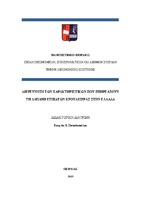Διερεύνηση των χαρακτηριστικών που επηρεάζουν τη δαπάνη επιβατών κρουαζιέρας στην Ελλάδα
Investigation of the characteristics that affect cruise passengers' expenditures in Greece

Doctoral Thesis
Συγγραφέας
Παπαδοπούλου, Γεωργία Χαράλαμπος
Ημερομηνία
2015Επιβλέπων
Σαμπράκος, ΕυάγγελοςΠροβολή/
Θεματική επικεφαλίδα
Cruise lines ; Θαλάσσιος τουρισμός ; Τουρισμός -- ΕλλάδαΠερίληψη
Η παρούσα διδακτορική διατριβή διερευνά τους παράγοντες εκείνους που ωθούν τους επιβάτες κρουαζιέρας να δαπανήσουν χρήματα κατά τη διάρκεια του ταξιδιού τους. Αρχικά γίνεται μια εκτενής αναφορά στη βιομηχανία της κρουαζιέρας σε παγκόσμιο και εθνικό επίπεδο και προσδιορίζεται η συνεισφορά της στον σχηματισμό του Ακαθάριστου Εθνικού Προϊόντος. Η ανάλυση της ζήτησης για κρουαζιέρα περιγράφεται σε επίπεδο εθνικό και περιφερειακό (Μεσόγειος, Αμερική, Ευρώπη κ.λπ.) αλλά και σε συνδυασμό με τα δημογραφικά, εισοδηματικά, επαγγελματικά, οικογενειακά και άλλα χαρακτηριστικά των επιβατών.Το επίκεντρο της διατριβής είναι η ανάλυση των χαρακτηριστικών των επιβατών κρουαζιέρας που επηρεάζουν το ύψος της δαπάνης για προϊόντα και/ή υπηρεσίες κατά τη διάρκεια της κρουαζιέρας τόσο πάνω στο κρουαζιερόπλοιο όσο και στα λιμάνια διέλευσης του πλοίου. Για το σκοπό αυτό, διενεργήθηκε έρευνα πεδίου σε επιβάτες κρουαζιερόπλοιων οι οποίοι ξεκίνησαν το ταξίδι τους από το λιμάνι του Πειραιά. Οι συμμετέχοντες προέρχονταν από διαφορετικές χώρες, ανήκαν σε διαφορετικές ηλικιακές ομάδες και είχαν διαφορετική οικογενειακό και οικονομικό προφίλ. Το ερωτηματολόγιο αφορούσε κυρίως στο ύψος της δαπάνης των επιβατών στα ελληνικά νησιά προσέγγισης του κρουαζιερόπλοιου αλλά και πάνω στο πλοίο και για το λόγο αυτό ζητήθηκε από τους επιβάτες να το συμπληρώσουν κατά τη διάρκεια της επιστροφής τους στο λιμάνι του Πειραιά. Η πραγματοποιηθείσα έρευνα συγκέντρωσε πρωτογενή στοιχεία και μπορεί να κατηγοριοποιηθεί στις διερευνητικές μεθόδους προσέγγισης, καθώς ζητείται να εντοπιστούν τα χαρακτηριστικά εκείνα που επιδρούν στη δαπάνη των επιβατών κρουαζιέρας. Ακολουθήθηκε ποσοτική έρευνα κατά την οποία ελήφθησαν υπόψη κριτήρια, όπως είναι η πολυπλοκότητα του ερωτηματολογίου, ο όγκος των πληροφοριών που ζητούνται, η αξιοπιστία των πληροφοριών, η αντιπροσωπευτικότητα του δείγματος, ο χρόνος διεξαγωγής της έρευνας και το κόστος διεξαγωγής της. Η συμπλήρωση των συγκεκριμένων ερωτηματολογίων προσέφερε πρωτογενή στοιχεία και αποτέλεσε το εργαλείο πάνω στο οποίο βασίστηκε η καταγραφή και ανάλυση όλων των παραγόντων που υπεισέρχονται στις δαπάνες των επιβατών της κρουαζιέρας. Για να εξαχθούν συμπεράσματα ακολουθήσαμε μια σειρά από στατιστικές αναλύσεις. Η μεθοδολογία που αναπτύξαμε στην παρούσα έρευνα, μετά τους ελέγχους ανεξαρτησίας των μεταβλητών, έχει ως σκοπό να βοηθήσει στην απάντηση συγκεκριμένων ερωτημάτων σχετικά με τα χαρακτηριστικά που επηρεάζουν τη δαπάνη των επιβατών κρουαζιέρας στην Ελλάδα. Πιο συγκεκριμένα, διερευνήθηκαν το προφίλ των επιβατών, τα χαρακτηριστικά του ταξιδιού, οι λόγοι προτίμησης της συγκεκριμένης κρουαζιέρας στα νησιά του Αιγαίου, το ύψος της δαπάνης τόσο πάνω στο κρουαζιερόπλοιο όσο και στα λιμάνια διέλευσης των πλοίων και τέλος τα χαρακτηριστικά εκείνα των επιβατών που επηρεάζουν τη δαπάνη τους κατά τη διάρκεια του ταξιδιού. Έγινε χρήση μη παραμετρικών μεθόδων στατιστικής ανάλυσης και συγκεκριμένα μιας ειδικής κατηγορίας μεταβλητών, οι κατηγορικές μεταβλητές, που είναι ευρέως διαδεδομένες στις κοινωνικές έρευνες για τη μέτρηση στάσεων και απόψεων. Η εξαρτημένη μας μεταβλητή ήταν η συνολική δαπάνη (ΣΔ) και με βάση αυτή αναδείχθηκαν τα χαρακτηριστικά των επιβατών που επηρεάζουν το ύψος της δαπάνης κατά τη διάρκεια της κρουαζιέρας, είτε μέσα στο κρουαζιερόπλοιο είτε στα λιμάνια προσέγγισης. Για τη διεξαγωγή των συμπερασμάτων επιλέχθηκε η μέθοδος της λογιστικής παλινδρόμησης (logistic regression), η οποία καθορίζει τις επιπτώσεις των πολλαπλών ανεξάρτητων μεταβλητών που παρουσιάζονται ταυτόχρονα για να προβλέψουμε τη σχέση που έχουν με την εξαρτημένη μεταβλητή. Προκειμένου να διερευνήσουμε τα χαρακτηριστικά των επιβατών αλλά και τη διάθεσή τους για δαπάνη, τόσο συνολικά όσο και σε κάθε δρομολόγιο ξεχωριστά, διαχωρίσαμε το δείγμα μας σε τρεις γενικές κατηγορίες. Πριν την κατασκευή του τελικού μας μοντέλου, δημιουργήθηκαν στατιστικά μοντέλα πρόβλεψης που τα διαχωρίσαμε σε τρεις κατηγορίες. Η πρώτη αφορά σε ολόκληρο το δείγμα (507 επιβάτες), η δεύτερη στο δείγμα που πραγματοποίησε 3μερη κρουαζιέρα και η τρίτη σε αυτό που πραγματοποίησε 8μερη κρουαζιέρα. Τα ευρήματα της παραπάνω έρευνας, όπως διαχωρίστηκε, κατέδειξαν ότι οι μεταβλητές που επηρέασαν τα κίνητρα των επιβατών για την πραγματοποίηση της κρουαζιέρας ήταν η γνωριμία νέων προορισμών και ανθρώπων, η επίσκεψη σε προορισμούς με ιστορική σημασία, η πρότερη επίσκεψη φίλων/συγγενών, η γνωριμία με τον ελληνικό πολιτισμό και η απόκτηση νέων εμπειριών.Η επιλογή του επιβάτη να πραγματοποιήσει κρουαζιέρα μεγάλης διάρκειας (8μερη) εξαρτήθηκε από το εισόδημά του, την οικογενειακή του κατάσταση, την πραγματοποίηση επίσκεψης στην Ελλάδα αποκλειστικά και μόνο για την κρουαζιέρα, το κόστος των διακοπών του (εκτός κρουαζιέρας) και το ύψος της δαπάνης στο κρουαζιερόπλοιο. Το ύψος της δαπάνης των επιβατών στα λιμάνια διέλευσης του κρουαζιερόπλοιου επηρεάστηκε από το ποσό που δαπάνησαν πάνω στο πλοίο, τη διάρκεια των διακοπών αλλά και την επίσκεψη σε περισσότερα νησιά. Αντίστοιχα, το ύψος της δαπάνης των επιβατών πάνω στο κρουαζιερόπλοιο επηρεάστηκε από τον τύπο καμπίνας, το ύψος της δαπάνης στα λιμάνια διέλευσης αλλά και την πραγματοποίηση ή μη των εκδρομών που προσέφερε η εταιρεία στα λιμάνια προσέγγισης. Στη συνέχεια, προσδιορίστηκε ένα μοντέλο που συνδέει τα κυριότερα χαρακτηριστικά με το ύψος της δαπάνης των επιβατών της κρουαζιέρας. Τα χαρακτηριστικά αυτά είναι το Ακαθάριστο Εγχώριο Προϊόν (ΑΕΠ), το εισόδημα των επιβατών, η οικογενειακή τους κατάσταση, ο τρόπος πληροφόρησης της κρουαζιέρας αλλά και η εθνικότητα. Με τη βοήθεια του υποδείγματος έγινε πλέον δυνατός ο ποσοτικός προσδιορισμός της επιρροής ενός εκάστου από τους προσδιοριστικούς παράγοντες στη δαπάνη κατανάλωσης κατά κατηγορία επιβάτη.


